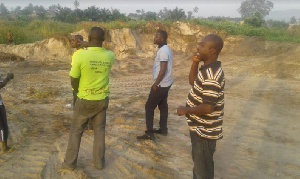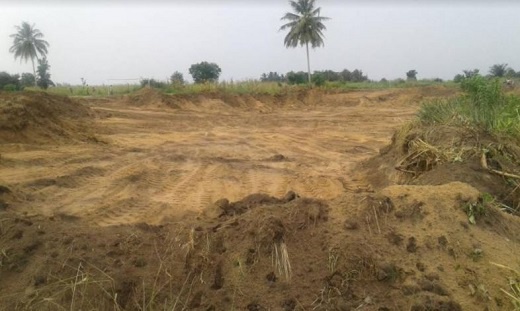 The sand winners are allegedly destroying crops of farmers.
The sand winners are allegedly destroying crops of farmers.
About 90 per cent of arable lands in Horbor, a farming community within the Ga South Municipality in the Greater Accra Region, have been destroyed by indiscriminate sand winning activities.
The situation has not only endangered the main source of livelihood for the indigenes but also threatened future agricultural productivity in the area as estate developers have begun acquiring the 'ruined' agric lands for development.
A visit by this reporter to the community over the weekend saw vast acres of farm lands left fallow with its top soils eroded while others had been taken over by flood waters and weeds obviously as a result of the illegality.
According to some residents, the nefarious act mostly took place on the blind side of the community as culprits usually operated at night and in cases where the act was carried out in daylight, "it was difficult to apprehend the criminals as they seem to have some level of protection".
"By the time you get to your farm in the morning, all your crops have been cleared with these machines for sand winning. I used to have about three to four acres of land on which I cultivated cassava and it was taken over from me without any compensation. For the past three years, I haven’t had any job to do," 65 year old Samuel Amoo told the paper.
A Senior High School leaver who spoke on condition of anonymity said, the situation had compelled him to resort to "okada" business as the only alternative means of employment in the community.
"I used to help my uncle on his farm but because of the sand winning activities, the land is no longer useful for farming so the only means to survive is to operate this okada business," he said.
Madam Patience Adukpo who trades in corn and cassava dough lamented that she had to travel to neighbouring communites to buy her products to sell at an extra cost since the illegal act had deprived the community of all of its cash crops. "This place was the hub of quality cassava dough and people travelled from far and near to purchase our produce and engage in other agricutural activities but that is no more because of the sand winning," she stated.
The Assembly Member for the area, Mr. John Padmore who equally expressed frustrations over the situation opined that "it was high time government stepped in to protect agric lands as several efforts on our own to ward off these miscreants have proved futile."
"This government intends to revamp the agric sector and promote food security with its Planting for Foods and Jobs policy but this cannot take place when government doesn't own these lands because the owners who mostly do not live in the community with us continue to sell the lands cheaply to miners and in the end, we the locals are the ones to bear the brunt."

He called for a re-orientation of the minds of Ghanaians to preserve and protect the environment from further destruction while urging the media not to relent on their efforts in ensuring that all activities detrimental to lives and the environment were stopped.
Meanwhile a five-member committee set up by Parliament to investigate activities of sand winning in the country had presented its report to the House on June 19, 2017.
The report among others recommended an amendment to the Minerals and Mining Act, 2006(Act703) to provide for a more decentralised system of license acquisition for sand winning and the establishment of a taskforce consisting of security officers, representatives from the District Assemblies, Environmental Protection Agency, Minerals Commission and where necessary Water Resources Commission at the district level in order to nip the canker in the bud.